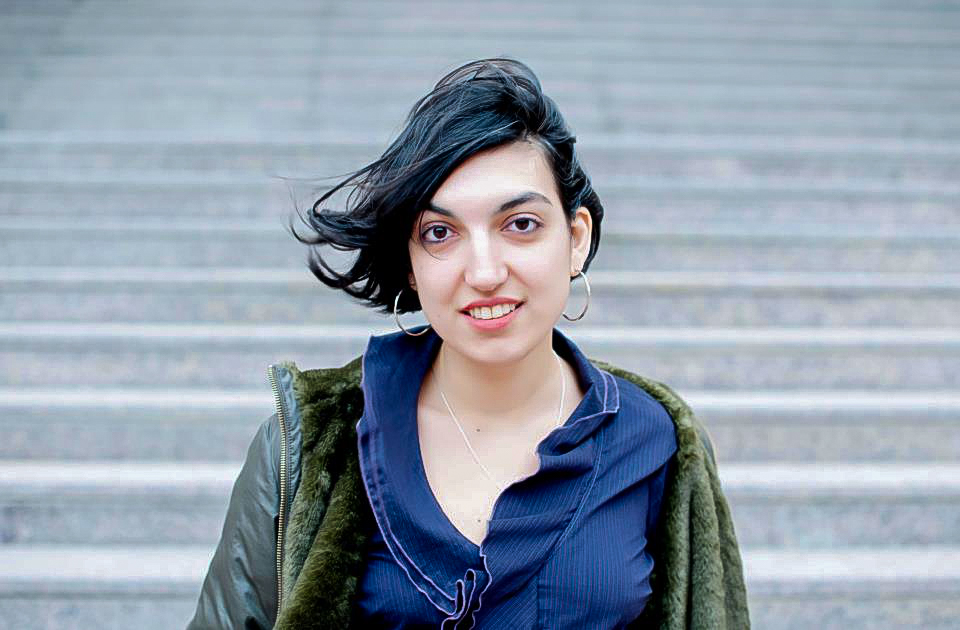
Last Wednesday, author and journalist Elif Batuman graced Russell House with a reading of some of her characteristically clever work. A staff writer for The New Yorker, Batuman was recently a writer-in-residence at the Koc University in Istanbul, and holds a Ph.D. in Comparative Literature from Stanford University. She was born to Turkish parents and grew up in New Jersey. She went on to study Russian literature as a graduate student.
Before the start of the reading, Batuman told a quick anecdote about purchasing a self-help book that recommended the disposal of home objects that no longer evoke joy. She consequently threw out every copy of her collection of essays, “The Possessed: Adventures with Russian Books and the People who Read Them,” in her apartment, and therefore had to read from an Australian copy of the book that she borrowed from Wesleyan. Most of the reading was dedicated to a segment of the collection called Who Killed Tolstoy?, which employs Batuman’s pet theory that Tolstoy was murdered as an exploratory tool to meditate on the man, his life, and his death. The piece is set at a conference on Tolstoy at his ancestral manse.
Batuman primarily writes about literature, specifically that of the Great Russians, in a vivifying manner that brings these vaunted and monolithic classics to life. Hers is a rich, drily funny, and slightly goofy gaze, as touched on by Visiting Professor of English, Hirsh Sawhney’s introduction. Ascribing her the role of author, essayist, and traveler, he said, “[Batuman has a] hunger for knowledge and a faith in serendipity and Pushkin’s prose.” He also noted her expert linking of literature and life, expressing, “[It is] personal, reflective, rigorous, and literary.”
Batuman’s work makes the argument for reading as living. In her prose, she perennially links some detail of a rainy day to an epigrammatic stream of associations, hooking a Sherlock Holmes case to an anecdote from Tolstoy’s married life, to a brief biography of one of his acolytes. She calls her new book, “The Idiot,” a semi-autobiographical novel, but chose not to read from it, saying that she didn’t yet feel completely happy with the work. Instead, she shared excerpts from her first book, “The Possessed.”
One of the most pleasurable hallmarks of Batuman’s writing is a deep and genuine intellectual curiosity, a true delight in the eccentric and tragic outsized-ness of the individuals she chronicles. It’s this delight, curiosity, and intellectual pleasure that animate her work and her voice. As liberal arts students, we consume so much so quickly, both in terms of literature and culture, that pleasure can often take a backseat or even ease itself out of the picture to clear space for the gorging. Why do we read, if not for pleasure? Where do we want to get with the books or articles we read and tear to pieces on a daily basis? Do we want or need them to be meaningful to us at all? You can’t really teach pleasure of any kind, and you can’t really teach delight. It has to take seed and grow, and it’s increasingly rare. However, Batuman’s work possesses it.
Batuman speaks and writes to the pleasure of reading outside of academic confines. This is not to say there’s any hippy-dippy “Dead Poets Society” style goofery in her work. Instead, she demonstrates an internalization of theory and a sophisticated manner of thinking and writing about art, not to mention a rich sense of humor and empathy with the sad weirdo geniuses whose work she adores. Behind the Russell House podium, Batuman self-annotated as she read, skipping over chunks and paragraphs that she deemed boring in the moment.
“And then there’s a part where I go to the library and read,” Batuman summarized, flipping over a couple pages. “Riveting stuff.”
Batuman also occasionally read punctuation out loud, noting periods, commas, and quotation marks. At one point, she veered into a description of the friendship between Tolstoy, the vastly bearded titan, and Chekhov, the sickly playwright-slash-short story writer. Her account rendered the friendship in a significantly less academic tone than most Russian literature devotees would most likely ascribe it. In Batuman’s description, Tolstoy and Chekhov sit side by side, looking out at the sunset. Tolstoy demands to know if Chekhov was very profligate in his youth, a question at which the latter stammers and stutters. Tolstoy, meanwhile, glares out at the horizon and growls, “I was insatiable.”
During a brief Q&A following the reading, Batuman acknowledged the tension between her nationality and the subjects she studies, revealing that she often has to navigate the tensions between Turkey and Russia in her work.
And she does so with grace and humor, her effusive and funny attitude on Wednesday night only adding to the charm of her writing. She possesses a warmth that compellingly acknowledges and intersects with the black-comic mordancy that twines itself throughout her work. Her personal demeanor brings this biting humor to the fore, augmenting and nuancing it.
In a telling moment during the Q&A session, Batuman responded to an audience member’s question that her favorite character from “War and Peace” is the French soldier who hangs out with Pierre in Moscow and drinks champagne after the rest of the city has fled. This response aptly demonstrates the position she takes in her writing: acknowledging, appreciating, and attributing a certain grace to the little parts of life that often go overlooked.


Leave a Reply